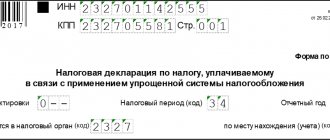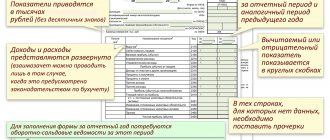1st sample: appeal against the decision of the tax authority
Other options for the name of the document may be: an appeal against the decision of the tax inspectorate or an appeal to the tax office.
In any case, we are talking about the same thing. An appeal (AJ) is a person’s appeal to the tax authority with a request to appeal the decision of the tax authorities to prosecute for committing a tax offense or a decision to refuse such prosecution, which was made under Art. 101 NK. In this case, two conditions must be met:
- in the opinion of the person, the appealed decision violates his rights;
- it has not entered into force.
Now about where to write a complaint against the tax inspectorate.
As such, the appeal takes place to a higher tax authority (VNO), but under clause 1 of Art. 139.1 of the Tax Code, a complaint to a higher tax authority is submitted through the authority whose decision is being appealed, since it is from there that it (with all attached materials) is transferred to the VNO within three working days (from the date of receipt). Thus, direct filing of a complaint with a higher tax authority is not possible.
Receipt of the tax bill for the Federal Tax Service means that its decision does not become valid, therefore, a demand for payment of tax (penalties, fines) on the appealed decision is not made.
Above the Federal Tax Service are the Federal Tax Service Directorates for the constituent entities of the Russian Federation. Above these departments and interregional Federal Tax Service Inspectors is the Federal Tax Service, whose decisions, according to paragraph 4 of Art. 139.1 of the Tax Code can only be challenged in court.
How to file a complaint online on the Federal Tax Service website
Submitting an application through the website of the Federal Tax Service - nalog.ru is the most optimal way to carry out the procedure due to the complete automation of the system, which means that the applicant will not be able to fulfill the contradictory requirement of the tax authority.
Sending a document to a higher authority through third-party methods on the Internet, including an email, is an unnecessarily complicated process due to the lack of specific rules of procedure.
You can file a complaint from your Personal Account provided by the service. With this method, the identity and authority of the applicant are considered fully confirmed. To gain access to the Personal Account, the taxpayer must personally contact the tax office once, where it is necessary to certify the identity card, and then receive the details for accessing the profile on the website.
When going through the procedure of verifying your identity and credentials, you will also need to fill out the registration form of the application, namely the following lines:
- Name of the tax authority.
- Last name First name Patronymic name of the person.
- TIN.
- Which authority was the appeal submitted to?
- Contents of the document.
In addition, the complaint registration card can be supplemented by attaching a photo file or a scanned version of the appeal, which is presented in writing and contains the personal signature of the complainant.
Submission algorithm without a taxpayer’s personal account
Step 1
- Go to the Federal Tax Service website – nalog.ru
- Select region in the upper left field
- Select the status of the person filing the complaint - individual, legal entity or individual entrepreneur
Step 2
After following the link, scroll down and find the block “Filing a complaint with the tax authorities.” Click on it.
Step 3
Select the item “I want to address another issue.”
Click the “Create Appeal” button, select your life situation and fill out the data step by step.
If your situation is not in the list, then go back and select the “Other appeals” button. Fill the form.
How to send an appeal through the taxpayer’s personal account
On the main page you need to select the status of the person who is filing the complaint - individual, legal entity or individual entrepreneur. Click the “Login to your personal account” link. Enter your registration data and then select “Submit an appeal” in your personal account.
Read more about how to complain about the tax office via the Internet on our website.
About methods of feeding AF
The necessary documents can be submitted either personally or through a representative as follows:
- via telecommunication channels, through the taxpayer’s personal account;
- by mail;
- in person to the appropriate office or document collection window.
The petition contains:
- Personal data of the applicant (full name plus place of residence for an individual or name plus address for an organization).
- Subject of appeal (decision regarding specific persons - in this case, in other situations this could be actions or inaction of tax officials).
- Name of the offending authority.
- The reasons why the submitter believes that his rights have been violated.
- Final requirements of the applicant.
- Information on how convenient it is to receive an answer based on the results of its consideration: on paper, in electronic form via telecommunication channels or through the taxpayer’s personal account.
Additional data may include telephone, fax numbers, email addresses, and other necessary information. The AJ is supplemented with a maximum of evidence indicating that the complainant is right, and a representative power of attorney is also attached to it (if it is necessary to submit through a representative). The document must be signed by the submitter (his representative).
Nuances of filing a complaint, technical features
We list some features that should be taken into account if you want to appeal the decision of the tax authority:
- A complaint can be submitted either on paper or using accessible means of communication;
- The document must contain all the information specified for its content;
- The complaint must contain references to regulations, as well as other compelling arguments that will help prove the applicant is right;
- If there are any other procedural violations on the part of employees of the Federal Tax Service, they must also be indicated.
The technical design features will be as follows:
- It is unacceptable to present unreasoned facts. After each example, it is necessary to refer to the law, the norms of the Tax Code of the Russian Federation, the judicial practice of arbitration and higher arbitration courts, letters and explanations of the relevant departments;
- It is required to indicate the facts indicating the exclusion of liability, mitigation of punishment, and the absence of the taxpayer’s guilt.
About consideration of AJ
Clause 1 of Art. 140 of the Tax Code allows you to provide additional documents before the claim is resolved (during its consideration). Moreover, it will be necessary to explain why these additions were not provided earlier (clause 4 of Article 140 of the Tax Code). The EIT considers the application without the participation of the person submitting it. Exceptions will be cases where contradictions are identified between information from the audit materials and information received from the taxpayer. In such a development, the petitioner is notified of where and when it will be considered.
The AJ can be withdrawn in whole or in part until it is resolved. Also, the VNO may leave the claim without consideration in whole or in part, there are three reasons for this:
- The order from clause 1 of Art. has been violated. 139.2 of the Tax Code (not in writing, there is no signature of the complainant or his representative, it is not indicated what exactly violated the rights of the complainant).
- The person who filed the claim declared its full or partial withdrawal before its consideration.
- An AJ has already been filed on the same grounds.
AJ is permitted by UNO within a month after receiving it. This period can be extended by a maximum of a month.
There are also three possible outcomes of the appeal:
- The requirements from the complaint are not satisfied.
- The disputed decision of the tax authorities is canceled in whole or in part.
- The cancellation is accompanied by the adoption of a new decision on the case.
The decision on the AJ within three days after its adoption is handed over (sent) to the applicant.
Deadlines and procedure for filing an appeal
Once the tax authority’s decision is in the hands of the applicant, the appeal must be sent within 10 days.
If this deadline is missed, the higher authority will not consider such a complaint. The procedure for submitting the document in question looks something like this:
- After the tax authority receives the document, it must be forwarded with all available attachments and documentation to the senior inspectorate within 3 days.
- You can file an appeal at any time, but no later than this tax decision comes into force. If this happens, then you need to file not an appeal, but a regular one. And if the deadline was missed, you can try to restore your rights.
- The decision on the appeal (unless it was decided to leave it without consideration) must be made within 30 days from the date of receipt of this paper. This period can be extended for another 30 days in accordance with paragraph 6 of Art. 140 Tax Code of the Russian Federation.
- The citizen who filed the application will be notified of the decision made on his complaint. This will happen no later than 3 days from the day the review result is ready. If this does not happen, this is a serious violation on the part of government agencies.
All deadlines are calculated exclusively in working days.
If the appeal was filed on the 1st of the month, on Monday, and is considered within 30 days, then the period will expire 10 days later (since weekends are not counted). An appeal is a good way to declare a violation of your rights. If any action or inaction reflected in the tax decision is non-regulatory, then a correctly filed appeal can change a lot. Take into account the timing, order and other nuances of submitting this document so that at a key moment there is no refusal.
2nd sample: complaint about inaction of the tax inspectorate
Another option for the name of such a complaint could be “Sample complaint about inaction of the tax authority.” In this case, the inaction of inspection officials is being appealed. Moreover, the nuances of the appeal are almost identical to those stated above. True, the review period in this case is 15 days with the possibility of extension for another 15, and not 30, as in the previous version.
Filing a claim in court
If the taxpayer does not agree with the decision of the higher tax authority or the higher tax authority did not consider the complaint within the prescribed period, you can file a claim in court (Clause 2 of Article 138 of the Tax Code of the Russian Federation). To do this, you need to pay a fee of 3,000 rubles. (Article 333.21 of the Tax Code of the Russian Federation).
Information to be included in the claim
- name of the arbitration court to which the claim is filed;
- for organizations - name of the plaintiff, location; for individual entrepreneurs - place of state registration, telephone number and e-mail;
- the name of the body or person that adopted the contested act and the higher tax authority;
- name, number and date of adoption of the contested act;
- the cost of the claim (if the claim is subject to assessment);
- what rights of the applicant were violated;
- references to laws and regulations that do not comply with the decision of the tax authority;
- the applicant's demand to recognize a non-normative legal act as invalid, decisions and actions (inaction) of officials as illegal.
4th sample: complaint against the tax inspectorate to the prosecutor's office
The prosecutor's office oversees the correct application of legislation, including tax law. Therefore, you can go there in case of any violations of taxpayers’ rights by the Federal Tax Service. The nuances of such appeals are regulated by Art. 10 Federal Law dated January 17, 1992 No. 2202-1 and Order of the Prosecutor General’s Office of Russia dated January 30, 2013 No. 45.
You need to complain to the prosecutor's office at the location of the Federal Tax Service.
Structurally, the claim includes three elements:
- Heading, which initially indicates information about the prosecutor's office (full name with address, as well as full name and rank of the head). The next will be the applicant’s personal information (his full name, registration address, contacts for feedback). The final data will be the tax office - the violator of your rights.
- Information block: you need to state the essence of the problem as briefly and accurately as possible, describing the events that led to the dispute, the violations that were committed, as well as your request to the prosecutor's office.
- Conclusion. The evidence attached to the application is listed here. These may be audio and video recordings, documents, etc. indicating a violation. Here the appeal is dated and signed.
When drawing up a complaint to the prosecutor's office, you should adhere to a business style and clear wording, without insults or profanity, indicating only true facts.
There are several ways to file a claim:
- by mail - by registered or valuable letter with acknowledgment of delivery or an inventory of the contents, respectively;
- through the box installed in the prosecutor’s office “for citizens’ appeals and applications”;
- to the prosecutor's office. Here, a stamp is affixed to the first and second copies of the complaint, as well as a mark and signature indicating acceptance and assigning an incoming number to the document;
- through the Internet reception of the Prosecutor General's Office.
The prosecutor's office considers incoming claims in the manner and within the time frame established by Order of the Prosecutor General's Office of Russia dated January 30, 2013 No. 45. The usual period for reviewing a claim is 30 days after its registration. If additional verification and study of received materials is not required, they will be sorted out within 15 days. If necessary, the indicated time is extended by the same amount. The person who filed the complaint is notified of the extension.
For the applicant, there are two possible outcomes of the analysis of his appeal: positive and negative. The latter means that, from the point of view of the prosecutor’s office, the Federal Tax Service is right. The taxpayer himself decides whether to agree with this option or not; his disagreement means a further trip to court. A positive scenario means that prosecutors have identified a violation of the law and will force tax officials to comply with it, of which the applicant will also be notified.
Sample complaints:
Appeal
To inaction
To action
Grounds for filing a complaint
It is advisable to file a complaint against the tax authority when you do not agree with its decisions or actions, but the inspectorate itself refuses to eliminate its violations. The most common reasons for such situations are:
- refusal to provide a tax deduction;
- personal data obtained during the processing of personal information was disclosed;
- taxes have been calculated incorrectly;
- denial of admission or service during reception hours;
- accrual of penalties for tax already paid;
- assessment of property taxes that are no longer owned.
At the same time, a violation on the part of the tax authorities can manifest itself not only in an illegal refusal or other action, but also in inaction or ignoring received applications.
Important! The peculiarity of appealing the actions of the Federal Tax Service is that its procedure is regulated by the Tax Code of the Russian Federation, and not by the Law on Citizens' Appeals. Therefore, when filing a complaint, you should take into account the provisions of Chapter 19 of the Tax Code of the Russian Federation.







